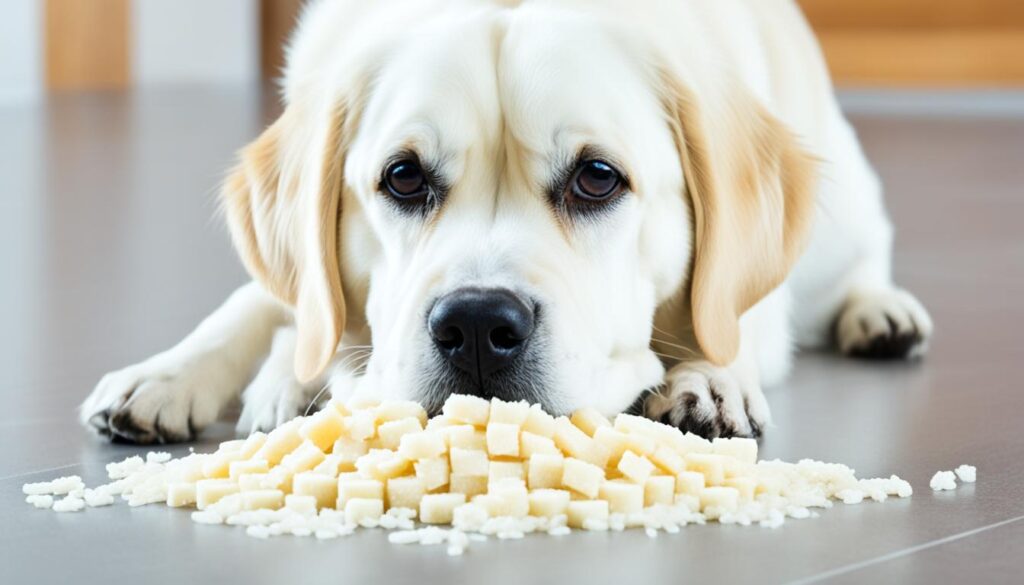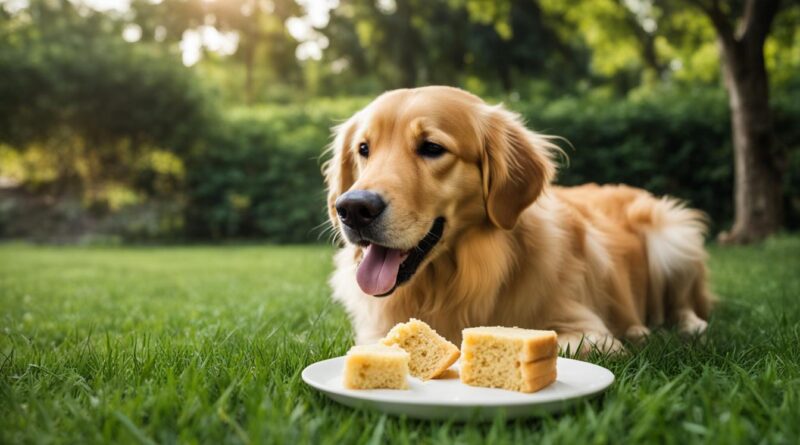Can Dogs Have Rice Cakes? Safety & Nutrition Tips
Dogs are wonderful companions who bring joy and love into our lives. As pet owners, it’s essential that we provide our furry friends with a balanced and nutritious diet to ensure their overall health and well-being. While we may enjoy snacking on rice cakes ourselves, it’s natural to wonder if dogs can also indulge in this crunchy treat. In this article, we will explore the safety and nutrition aspects of dogs consuming rice cakes and provide tips to make informed decisions about their diet.
Key Takeaways:
- Rice cakes can be a safe and low-calorie treat for dogs when consumed in moderation.
- They can serve as a suitable option for dogs with dietary restrictions or sensitivities.
- However, it’s important to consider potential risks such as digestive issues and allergic reactions.
- Consulting with a veterinarian and exploring alternative treat options is advised before introducing rice cakes into a dog’s diet.
- Rice cakes do not offer significant nutritional value and should not replace a balanced and appropriate diet for dogs.
Are Rice Cakes Nutritious for Dogs?
While rice cakes can provide dogs with carbohydrates and fiber, they do not offer significant nutritional value. They should not replace a balanced and appropriate diet for dogs. Incorporating rice cakes as an occasional treat can be beneficial for dogs who enjoy the crunchy texture and as a low-calorie alternative to high-calorie treats. However, other sources of essential nutrients should be included in a dog’s diet.
Dogs thrive on a well-rounded diet that includes a variety of nutrients. Rice cakes alone do not provide the necessary vitamins, minerals, and proteins that dogs need for optimal health. While they can be a tasty and enjoyable snack, it is essential to ensure that dogs receive a complete and balanced diet that meets their specific nutritional requirements.
According to veterinarians, the benefits of rice cakes for dogs are mainly related to their low-calorie nature. They can be a suitable option for dogs who need to manage their weight or maintain a lean body condition. The low-calorie content of rice cakes can help prevent weight gain and reduce the risk of obesity in dogs. However, it is crucial to remember that treats, including rice cakes, should only make up a small portion of a dog’s daily calorie intake.
The Nutritional Value of Rice Cakes for Dogs
Rice cakes are primarily composed of cooked rice, which provides dogs with carbohydrates. Carbohydrates are an important energy source for dogs and play a role in supporting various bodily functions. However, rice cakes do not provide a significant amount of protein, fat, vitamins, or minerals that dogs require in their diet.
Here is an overview of the nutritional composition of rice cakes:
| Nutrient | Amount per 100g |
|---|---|
| Calories | 381 |
| Carbohydrates | 83g |
| Protein | 7.6g |
| Fat | 1.4g |
| Fiber | 0.7g |
| Vitamin C | 0mg |
| Calcium | 5mg |
| Iron | 0.9mg |
As seen in the table above, rice cakes are low in fat and contain a small amount of protein. They also lack significant amounts of fiber, vitamins, and minerals. While these treats can provide dogs with energy from carbohydrates, they should not be relied upon as a sole source of nutrition.
Including a variety of nutrient-rich foods in a dog’s diet is essential for their overall health and well-being. A balanced and appropriate diet for dogs should consist of high-quality protein sources, healthy fats, and a variety of fruits and vegetables to ensure they receive essential vitamins and minerals. Consulting with a veterinarian is recommended to develop a personalized diet plan for your dog.
Potential Benefits of Dogs Eating Rice Cakes
Dogs can derive multiple benefits from consuming rice cakes as part of their diet. While rice cakes may not be nutritionally dense, they offer various advantages for canines when incorporated in moderation.
Versatile Snack Option
Dogs eating rice cakes enjoy the versatility of this treat. Rice cakes can be easily broken into smaller pieces or used as a whole snack, catering to different preferences and sizes of dogs.
Promotes Digestive Health
Rice cakes contain fiber, which aids in promoting digestive health for dogs. Fiber helps regulate bowel movements and can alleviate constipation or other digestive issues that dogs may experience.
Supports Weight Management
One of the benefits of rice cakes for dogs is that they offer a low-calorie option for canines. This makes them suitable for dogs on weight management plans or those who need to shed a few pounds. Rice cakes can help dogs feel satiated without consuming excessive calories.
Carbohydrates for Energy
Rice cakes are a good source of carbohydrates for energy, providing dogs with a quick and easily digestible fuel source. This can be especially beneficial for active dogs or those participating in training or physical activities.
Reduced Allergenic Potential
Rice cakes as dog treats are generally well-tolerated by most dogs and have a low allergenic potential. This makes them a suitable option for dogs with food sensitivities or allergies, offering an alternative treat choice.
Additional Nutrients
Although rice cakes may not provide substantial nutrition, they do offer some essential nutrients for dogs. These treats contain small amounts of vitamins and minerals that can complement a dog’s overall dietary intake.
Promotes Dental Health
Rice cakes for dogs can contribute to dental health by promoting chewing and reducing plaque buildup on teeth. The crunchy texture of rice cakes can help remove tartar and improve oral hygiene.
Remember, moderation is key when feeding rice cakes to dogs. Individual dietary needs, specific health conditions, and the overall balance of a dog’s diet should always be taken into consideration.

Potential Risks of Dogs Eating Rice Cakes
While rice cakes may seem like a harmless treat for dogs, there are potential risks associated with their consumption that pet owners should be aware of. It is important to consider these risks before introducing rice cakes into your dog’s diet.
Digestive Issues
Dogs eating rice cakes can experience digestive issues such as constipation or diarrhea, depending on the amount consumed. The high fiber content in rice cakes can potentially disrupt the delicate balance of a dog’s digestive system. It is essential to monitor your dog’s bowel movements and consult with a veterinarian if any irregularities occur.
High Sodium Content
Rice cakes contain a high amount of sodium, which can be detrimental to a dog’s health if consumed excessively. An excessive intake of sodium can lead to high blood pressure, dehydration, and even kidney damage. It is crucial to be mindful of the sodium content in rice cakes and consider alternative low-sodium treat options for your furry friend.
Allergic Reactions
Just like humans, dogs can also have food allergies or sensitivities. Some dogs may be allergic to certain ingredients present in rice cakes, such as gluten or additives. If your dog has a known food allergy or sensitivity, it is important to avoid feeding them rice cakes to prevent potential allergic reactions.
To ensure the well-being of your dog, it is recommended to consult with a veterinarian before introducing rice cakes into their diet. A professional can provide personalized advice based on your dog’s specific needs and health conditions.

| Risks of Dogs Eating Rice Cakes: |
|---|
| Digestive Issues |
| High Sodium Content |
| Allergic Reactions |
Alternatives to Rice Cakes for Dogs
If you’re looking for safe and healthy treat options for your dog, there are several alternatives to rice cakes to consider. These options provide a balanced and nutritious diet for dogs without the potential risks associated with rice cakes:
- Dog-friendly fruits and vegetables: Incorporating fresh fruits and vegetables into your dog’s diet can offer a variety of vitamins, minerals, and antioxidants. Some popular options include apples, blueberries, carrots, and green beans. However, it’s important to avoid toxic fruits and vegetables such as grapes, raisins, onions, and garlic.
- Commercially available dog treats: There are numerous dog treats available in the market that are specifically formulated to meet the nutritional needs of dogs. Look for treats that have high-quality ingredients, are free from additives and preservatives, and provide a range of nutrients to support your dog’s overall health.
- Home-cooked rice options: If you still want to incorporate rice into your dog’s diet but prefer to avoid rice cakes, plain cooked rice without seasoning can be a suitable alternative. Cooked rice provides carbohydrates for energy and can be mixed with other ingredients like lean proteins or vegetables to create a nutritious meal for your dog.
By offering these safe treat options, you can ensure that your dog enjoys a variety of flavors while receiving the necessary nutrients without the potential risks associated with rice cakes.
Comparative Table: Rice Cakes vs. Alternatives
| Treat Options | Nutritional Value | Benefits | Potential Risks |
|---|---|---|---|
| Rice Cakes | Low | – Low-calorie option – Crunchy texture |
– Digestive issues – High sodium content – Potential allergenic reactions |
| Dog-friendly fruits and vegetables | High (variety of vitamins, minerals, antioxidants) | – Provides essential nutrients – Supports overall health – Adds variety to the diet |
– Potential toxicity (avoid toxic fruits and vegetables) |
| Commercially available dog treats | Depends on the specific treat | – Formulated for nutritional needs – Convenient to purchase – Offers a wide range of flavors |
– Potential additives or preservatives (choose high-quality products) |
| Home-cooked rice options | Depends on the specific recipe | – Provides carbohydrates for energy – Can be mixed with other nutritious ingredients |
– Digestive issues if not prepared properly (plain cooked rice without seasoning) |
Conclusion
In conclusion, dogs can enjoy rice cakes as an occasional treat, but they should not be a significant part of their regular diet. While rice cakes are generally safe for dogs when they are plain and unseasoned, they do not provide substantial nutritional value.
It is crucial for dog owners to be aware of the potential risks associated with feeding dogs rice cakes. Digestive issues such as constipation or diarrhea may occur if the rice cakes are consumed in excessive amounts. Additionally, rice cakes often contain a high sodium content, which can be harmful to dogs and may lead to health problems like high blood pressure, dehydration, and kidney damage.
Consulting with a veterinarian is essential before introducing rice cakes or any new treat into a dog’s diet. Veterinarians can provide guidance based on the individual dietary needs and specific health conditions of the dog. Exploring alternative treat options, such as dog-friendly fruits and vegetables, commercially available dog treats formulated for nutritional needs, or plain cooked rice without seasoning, can be a better choice to ensure a balanced and nutritious diet for dogs.
FAQ
Can dogs have rice cakes?
Yes, dogs can have rice cakes as an occasional treat.
Are rice cakes nutritious for dogs?
Rice cakes do not offer significant nutritional value for dogs. They can provide carbohydrates and fiber but should not replace a balanced and appropriate diet.
What are the potential benefits of dogs eating rice cakes?
Dogs eating rice cakes can experience benefits such as versatility as a snack, promotion of digestive health, support for weight management, supply of carbohydrates for energy, reduced allergenic potential, additional nutrients, and promotion of dental health.
What are the potential risks of dogs eating rice cakes?
Dogs eating rice cakes may potentially experience digestive issues such as constipation or diarrhea. Rice cakes also contain a high sodium content, which can pose risks such as high blood pressure, dehydration, and kidney damage. Dogs with allergies or sensitivities may experience allergic reactions.
What are some alternatives to rice cakes for dogs?
Safe treat options for dogs include dog-friendly fruits and vegetables, commercially available dog treats formulated for nutritional needs, and home-cooked rice options (plain cooked rice without seasoning).
Can rice cakes be a staple food in a dog’s diet?
No, rice cakes should not be a staple food in a dog’s diet. They should only be given as an occasional treat.


